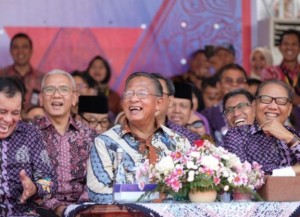Govt Provides Lands for Cooperatives through Agrarian Reforms

Coordinating Minister for the Economy Darmin Nasution attends the National Cooperative Day Commemoration, in Purwokerto, Central Java, Friday (12/7). (Photo by: Coordinating Ministry for the Economy PR)
Through its agrarian reforms and social forestry program, the Government provides land, access to capital, markets, and skills needed to be managed by cooperatives, Coordinating Minister for the Economy Darmin Nasution has said.
In addition, cooperatives can be granted ownership rights to land or 35-year management permits for forest areas, he added.
Darmin went on to say that land sources for agrarian reforms are sourced from non-extended land with cultivation rights (HGU) or ex-HGU, abandoned land, transmigration land, and forest areas waived for agrarian reform. Meanwhile, social forestry lands are entirely sourced from forest areas reserved for communities living around the forests, he added.
Agrarian reforms and social forestry are in the economic equality policy. This policy is to improve the community’s sustainable economy, Darmin said in the commemoration of National Cooperative Day in Purwokerto, Central Java, Friday (12/7).
According to Darmin, one cooperative can manage at least one cluster, adding that with a cluster system, land is managed in groups with one particular type of superior commodity, such as sengon (silk trees) and corn. With this system, he added, farming is expected to have competitiveness, sufficient productivity, and to achieve economies of scale.
One cluster consists of two or three villages, depending on the existing land areas and the number of farmers living in those villages, Darmin said, adding that with the cluster system, subsistence-based farming systems will transform into commercial agriculture and in turn improve farmers welfare. In addition, this will also make selection of cultivated plants and management of crops better, he said.
In addition to being eligible for land ownership rights of agrarian reform or social forestry management permits, Darmin said that cooperatives will receive assistance in the forms of agricultural production facilities, superior seeds, and post-harvest facilities such as dryers or warehouses, as well as Peoples Business Credit (KUR) from state-owned banks and obtain marketing guarantees for their products.
The Government will assign SOEs and large companies to become guarantors and off-takers and provide assistance, Darmin said.
In the meantime, to ensure continuity of income of farmers or cultivators from time to time, the Government has also designed an ideal composition of land use.
Farmers can plant types of annual crops, such as coffee and rubber plants, as well as seasonal crops, such as pineapple and corn, Darmin said.
As for maintaining adequacy of income of farmers or cultivators, the Government has designed a composition of fair yields so that the farmers benefit from the management of cultivation. By encouraging farmers to form clusters and build supporting facilities with the help of village funds, farmers welfare can be further improved, Darmin said.
For the record, the administration of Joko Jokowi Widodo and Jusuf Kalla is committed to implementing agrarian reform, one of Nawacitas (nine-point development program) main agendas.
Under Presidential Regulation Number 45 of 2016, five priority programs are listed related to agrarian reform, among others, strengthening regulatory framework and resolving agrarian conflict, arranging land ownership and ownership of objects of agrarian reform, providing legal certainty and certification of rights to land object of agrarian reform; empowering community in the use, utilization and production of land for objects of agrarian reform; and carrying out central and regional agrarian reform institutions. (Coordinating Ministry for the Economy PR/ES)
Translated by: Muhardi
Edited by: M. Ersan Pamungkas








